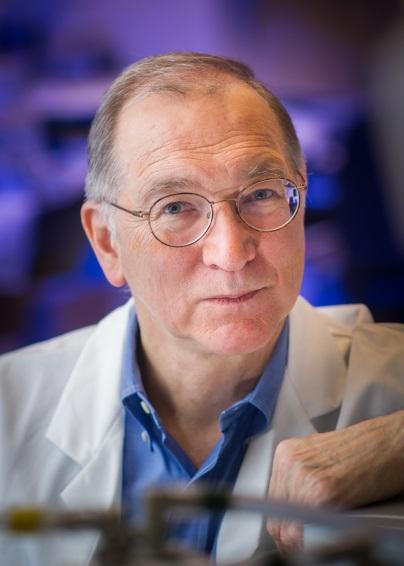U.S. District Court rules Dana-Farber scientist is an inventor on six critical immunotherapy patents
The U. S. District Court ruled today that a Dana-Farber Cancer Institute scientist, Gordon Freeman, PhD, and another scientist, Clive Wood, PhD, are co-inventors on a series of cancer immunotherapy patents previously issued to a Japanese researcher and Japanese drug company, and ordered that the patents be corrected to name Freeman and Wood as inventors.
In her decision, Chief Judge Patti B. Saris wrote that “Dana-Farber has presented clear and convincing evidence that Dr. Freeman and Dr. Wood are joint inventors” of the six patents at issue.
In 2015, Dana-Farber filed suit asking the U.S. District Court in Boston to correct the inventorship on six patents that were assigned to Ono Pharmaceutical Co., Ltd. and Tasuku Honjo, MD, PhD, of Kyoto University. The patents describe a cancer treatment that helps patients' own immune systems attack cancer cells in the body. This approach works by blocking the "PD-1/PD-L1" pathway, the centerpiece of a mechanism that cancer cells use to escape attack by a patient's T cells, thereby freeing the immune system to launch a more effective response against the disease. The trial was held over three weeks earlier this year.
In her findings, Saris noted that the three scientists’ “simultaneous focus on blocking the pathway to treat cancer in early 2000 shows that they were all working toward a shared goal.” The court also found that “conception of the inventions in the Honjo patents was the result of the collaboration of all three scientists.”
“I am delighted that the court recognized our essential contribution to these inventions,” said Freeman. “Patients are the real winners because we have discovered a new strategy to cure cancer.”
The decision will enable Dana-Farber to license the technology, which is currently embodied in several of the newest immunotherapy drugs, to additional companies seeking to develop PD-1 and PD-L1 antibody therapeutics for a wide range of cancers.
“Scientific research is collaborative by design and we are gratified that the court affirmed Gordon Freeman’s contributions to this seminal work, which will be recognized on the relevant patents,” said Laurie H. Glimcher, MD, President and CEO, Dana-Farber Cancer Institute. “Our focus now will continue to be on the best ways to get new therapies to patients as quickly as possible.”
In 2000, Freeman, Wood, and Honjo published a joint research study announcing the discovery of the protein PD-L1 (programmed cell death 1 ligand 1). The researchers found that PD-L1 exerts an inhibitory effect on T cells by binding to the T cell co-receptor PD-1, thereby signaling the T cell not to instigate an immune system attack. In pursuing his study of the PD-1/PD-L1 pathway, Freeman discovered that the PD-L1 protein is expressed not only on normal cells but also on many cancer cells. The implication was that an agent that blocks PD-1 or PD-L1 (or a related ligand, PD-L2) could release the brakes on the immune system’s attack on cancer. These discoveries prompted pharmaceutical companies to pursue the development of drug agents that block PD-1, PD-L1, or PD-L2. A half dozen of these drugs – known as immune checkpoint inhibitors – have received US Food and Drug Administration (FDA) approval for treating multiple types of cancers and are being tested in the clinic for treatment of a wide variety of other cancers.
Media Contacts
If you are a journalist and have a question about this story, please call 617-632-4090 and ask to speak to a member of the media team, or email media@dfci.harvard.edu.
The Media Team cannot respond to patient inquiries. For more information, please see Contact Us.
